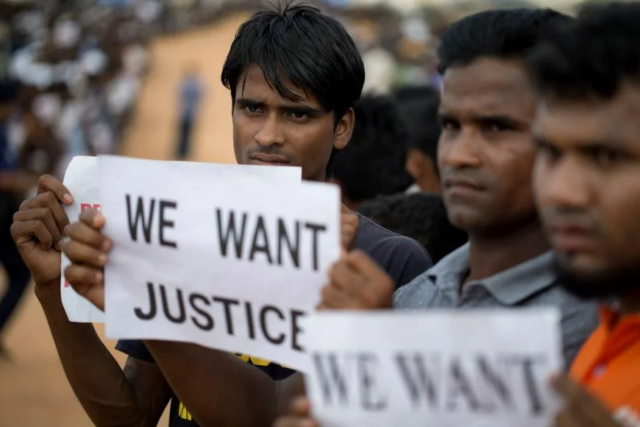Gambia Calls for Justice as Rohingya Face Dire Threats
28 February 2022


Rohingya refugees await the arrival of a U.N. Security Council team at the Kutupalong Rohingya refugee camp in Kutupalong, Bangladesh, April 29, 2018. © 2018 AP Photo/A.M. Ahad
Hearings End on Myanmar’s Preliminary Objections to Genocide Case
A week of legal proceedings at the International Court of Justice in the Hague ended with Gambia making a plea for the judges to move swiftly and ensure that justice for the Rohingya is delayed no longer.
On February 28, the hearings on Myanmar’s preliminary objections to Gambia’s case on the alleged genocide against Rohingya Muslims in Myanmar came to a close. Yet the court could take a year before it decides on whether the case can proceed. In the meantime, the court’s 2020 order to protect the 600,000 Rohingya remaining in Myanmar is still in place, providing a measure of protection. If the case proceeds, it would take several years before the court reaches a judgment.
While the representation of Myanmar at the court by junta officials has raised concerns, some Rohingya activists have welcomed hearing directly from those considered responsible for the atrocities in northern Rakhine State.
Rohingya activist Yasmin Ullah says watching the perpetrators of mass violence face the court has even been cathartic. “We have not heard once from the military in a legal court as they have always acted by proxy,” she said in a recent discussion.
The momentum to hold Myanmar’s military accountable is building, with a universal jurisdiction case underway in Argentina and an investigation at the International Criminal Court into crimes against humanity connected to the forced deportation of Rohingya to neighboring Bangladesh.
Achieving justice for the Rohingya has far-reaching consequences for all those who have suffered at the hands of Myanmar’s military. Abuses against the Rohingya have now echoed throughout Myanmar, as the commanders who oversaw the atrocities against the Rohingya and led a military coup more than a year ago are now carrying out apparent crimes against humanity against other groups across Myanmar.
In its closing statements, Gambia argued that Myanmar’s objections to the genocide case were merely a delaying tactic, and that any further delay in the proceedings may risk further atrocities against the Rohingya. If the case proceeds, Myanmar will need to respond to Gambia’s factual allegations that its security forces took part in a genocidal campaign against the Rohingya, an opportunity that many victims and their families have long been waiting for.
Announcements
21 May 2025
Open letter: Malaysia must lead ASEAN with principle, not hypocrisy, to address the Myanmar crisis

Progressive Voice is a participatory rights-based policy research and advocacy organization rooted in civil society, that maintains strong networks and relationships with grassroots organizations and community-based organizations throughout Myanmar. It acts as a bridge to the international community and international policymakers by amplifying voices from the ground, and advocating for a rights-based policy narrative.